Overview Link to this section
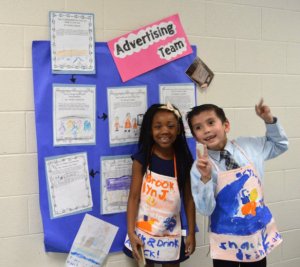
We each develop at our own pace, so it's impossible to tell exactly when a particular student will reach a specific milestone or learn a given skill. The developmental milestones below will give you a general idea of the changes you can expect as each eight and nine-year-old gets older, but don't be alarmed as each student takes a slightly different course. Honor where they are and support them as they develop.
Eight
Link to this section
Physical Development
-
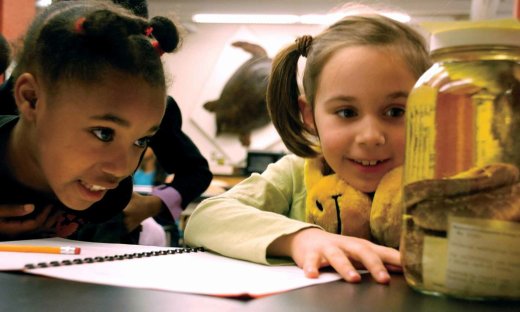
- Play hard and tired quickly; do better with several short play breaks versus one long break
- Growth spurts lead to some awkwardness in coordination
- Eyes focus well on objects near and far
- Better control of hands; can learn and use cursive writing if it's being taught
- Many using adult pencil grasp; some still need a pencil grip
Social & Emotional Development
-
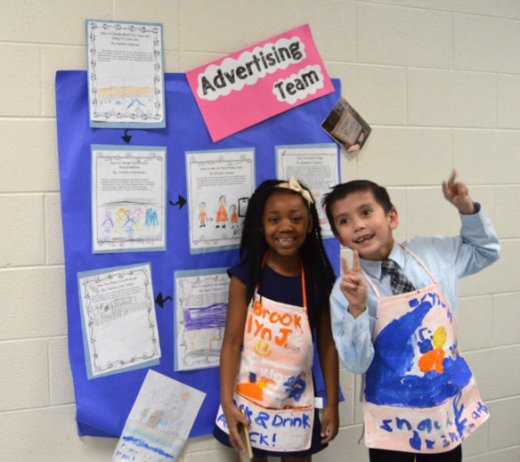
- Love to share humor ("Have you heard the one about...?")
- Love group activities and cooperative work; work best in groups that teachers change frequently throughout the year
- Adjust well to change; bounce back quickly from mistakes or disappointments
- May prefer working and playing with some classmates more than others; teacher leadership in whole-class games helps children mix
- Want peers' approval as much as the teacher's
- Respond well to class activities that build a sense of unity and cohesion, such as an annual spring hike or a service project to beautify the school
- A growing sense of moral responsibility and awareness of fairness issues beyond themselves; as a group, can rally around an issue that does not feel fair
- Form larger friend groups than at seven
Communication & Language
-
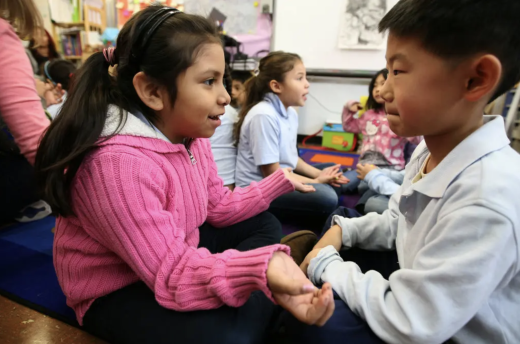
- Generally able to apply attention, but don't always remember what they've heard or are supposed to do; establishing "directions partners" can help them correctly record assignments and homework expectations and support each other outside of school if they forget homework directions
Cognitive Development
-
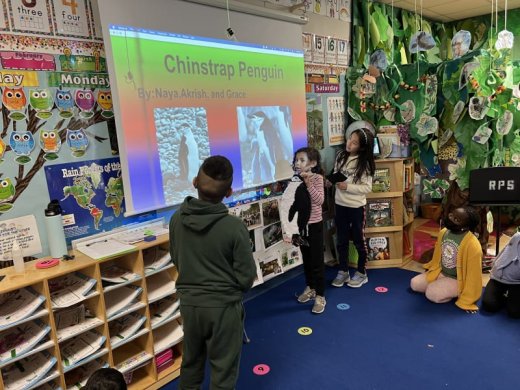
- Beginning to master handcrafts, computers, and drawing
- Very industrious; become engrossed in what they're doing, but have limited attention span; short exercise breaks help concentration
- Often take on more than they can handle; short assignments build confidence
- Enjoy responsibility, although do not always successfully complete tasks
- Usually organize work well; some need help with strategies like color coding their folders with stickers or putting due dates on assignments
- Show increasing interest in rules, logic, how things are put together, how things work, the natural world, and classification
- Can handle increasingly complex tasks but tire easily; may give up, but soon want to try again with a new idea about how to approach the task
- Care about both process and product of schoolwork, though they tend to be impatient and sloppy; love to add to work, but are not always interested in revising work
Reading, Writing, & Across The Curriculum
Reading - Provide opportunities for children this age to:
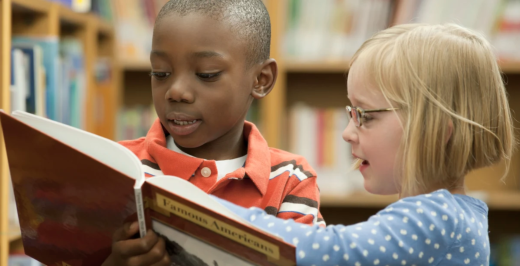
- Work in groups reading trade books or in core reading programs keyed to their skill level and interests
- Begin reading independently and doing simple independent assignments, such as making book covers, conducting interviews, or building dioramas
- Do projects that spur interest in reading and research and allow them to be "experts" on a topic, and present what they've learned to the rest of the class
Writing - Expect from children this age:
- Writing: Lengthy stories with increasingly descriptive language and much detail; interest in diverse kinds of writing, such as poetry, newspaper articles, and cartoons; beginning understanding of the importance of making drafts and revising
- Spelling: Increasing ability to spell correctly; readiness to learn compound words, dictionary use, and alphabetical order; skill development to a level that makes lingering phonetic mistake patterns and real difficulty in spelling more obvious
- Writing Themes: Adventures, animals, sports with friends and heroes, unicorns and other mythical beasts, stories based on cartoons, poetry about nature and the seasons, nonfiction writing based on concrete science and social studies investigations
Across the Curriculum - Provide opportunities for children this age to:
- Use illustrations along with words to understand and analyze text
- Release physical energy by participating in short physical activities throughout the day, structured playground games at recess, and physical education classes
- Work in cooperative groups, especially teacher-assigned groups that change frequently during the year
- Work on class projects that build unity, such as a service learning project
- Give each other support in remembering directions and assignments
- Develop their growing interest in how things work, classification, and the natural world through nonfiction reading in science and social studies
- Maintain a personal vocabulary notebook to record definitions of new words
Nine
Link to this section
Physical Development
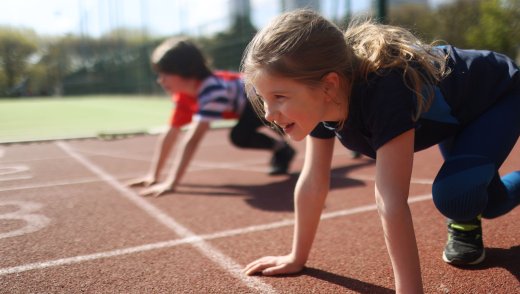
- Better coordination is evident in most all physical activity
- Like to push their physical limits, but tire easily
- Restless; can't sit still for long
- With better fine motor coordination and control, show more interest in producing detailed drawings and illustrations, scientific notation, comic strips, and graphic novels
- Benefit from practice with a variety of fine motor tools and tasks (weaving, knitting, carving, drawing, etc.) to increase manual dexterity
- May twist hair, bite nails, or purse lips to relieve tension
Social & Emotional Development
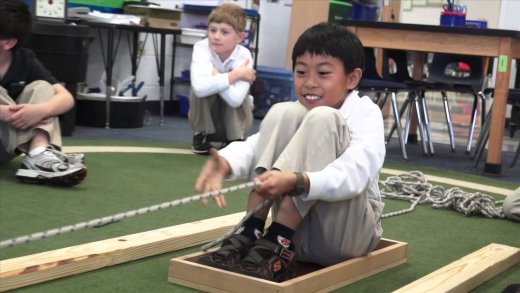
- More individualistic; caught up in trying out new ways of dressing and grooming and trying on different personas
- Impatient and easily frustrated; often say "I hate it" or "It's boring" when work is difficult or repetitious; adult encouragement helps them persevere
- Often feel worried or anxious; complain of and sometimes exaggerate physical hurts; needed adult lightheartedness and humor to relieve their anxiety and somberness
- very critical of self and others (including adults); often complain about fairness issues
- can be selling, moody, aloof, and negative 1 minute and goofy and fun-loving the next
- Like to work with a partner of their choice
- Have a sense of who is and who is out of certain groups in the lunchroom or on the playground; clicks may be problematic
- Very competitive; can work in groups but with lots of arguing
- Like to negotiate; this is the age of "Let's make a deal"
- Need adults to be patient and explain clearly, but concisely
Communication & Language
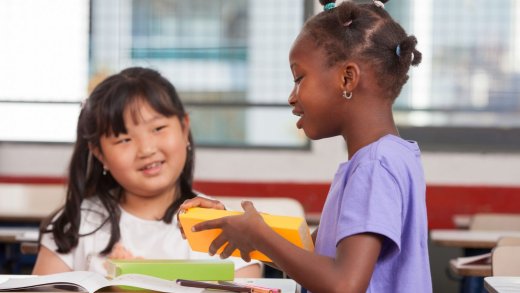
- Love descriptive language, wordplay, and new vocabulary; short dramatic skits or role-plays are popular
- Sometimes revert to baby talk when feeling anxious or silly
- Enjoy exaggeration, inappropriate jokes, and graffiti; adults need to be vigilant about how students are talking about marginalized people and what students are learning from the adults in their lives or online that reinforces stereotypes
- Enjoy and use technology and a range of social media to express ideas and thoughts
Cognitive Development
-
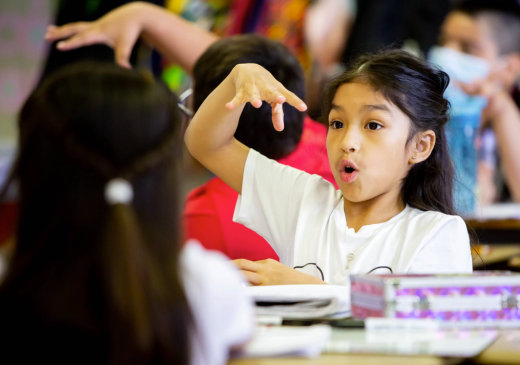
- Have trouble understanding abstractions, such as large numbers, long periods of time, or vast areas of space
- Beginning to be more aware, wondering about and exploring a bigger world of ideas, including issues of fairness and justice
- Able to manage more than one concept at a time (for example, when studying history, they can understand both "long ago" and "far away")
- Often ask, "Why do we have to do this?" and need homework related specifically to the next day's work
- Reading to learn instead of learning to read; most ready to read for information in books and newspapers and on websites
- Take pride in attention to detail and finished work, but may jump quickly between interests
- Able to copy from the board, recopy assignments, and produce visually attractive final drafts
Reading, Writing, & Across The Curriculum
Reading - Provide opportunities for children this age to:
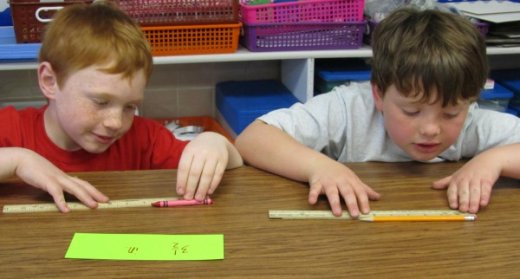
- Continue working in reading groups with a focus on comprehension and interpretation
- Tackle assignments that involve beginning research tasks and use of related reading material
- Intensively develop dictionary skills introduced at earlier ages
- Volunteer to read orally during read-aloud
- Explore poetry seriously throughout the year as readers and writers
Writing - Expect from children this age:
- Writing: Readiness for emphasis on the first draft and revision process; ability to utilize teachings about descriptive writing, character development, plot, cohesiveness, and believability; frequent episodes of "writer's block"
- Spelling: Improving use of dictionary skills; improving first-draft spelling; fewer mistakes with spelling in journals and subject writing; readiness for weekly spelling tests; mastery of basic capitalization and punctuation
- Writing Themes: Moving away, divorce, death, disease, and other worries; world issues; poetry about feelings and darker themes
Across the Curriculum - Provide opportunities for children this age to:
- Use and practice fine motor skills through printing, drawing, and crafts that require fine motor coordination
- Work with a partner of their choice some of the time; balance this with structures that help them work and play with all classmates, not just best friends
- Use drama to play with language and practice new vocabulary (for example, they could present a biographical sketch of a famous person and dress up in costume)
Credit Link to this section
This content on development comes from Yardsticks: Child & Adolescent Development by Chip Wood and has been lightly adapted to better reflect the language usage and practices of SFUSD.
This page was last updated on May 23, 2023

